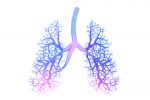#NACFC2021 – Trikafta Reduces Exacerbation Rate, Real-world Data Show
Written by |

Trikafta treatment can reduce the frequency of pulmonary exacerbations — times when lung symptoms get markedly worse — for people with cystic fibrosis (CF).
That’s according to an analysis of real-world data shared at this year’s North American Cystic Fibrosis Conference (NACFC), in an oral presentation, “Impact of Elexacaftor/Tezacaftor/Ivacaftor (ETI) therapy use on pulmonary exacerbation rates during the COVID-19 pandemic.”
Trikafta is an oral combination of three medications (elexacaftor, tezacaftor, and ivacaftor) that work to increase the functionality of the CFTR protein, in which defects cause CF. The therapy, which is sold by Vertex Pharmaceuticals, was first approved in the U.S. in late 2019, though that approval has since been expanded to cover more eligible mutations and younger patients.
Since Trikafta’s approval, there has been interest in how it would affect people with CF in the real world — for example, whether the treatment would lessen exacerbation rates. However, the first full year that Trikafta was widely available was 2020 — when many people avoided healthcare settings because of the COVID-19 pandemic, and many exacerbations likely went unreported.
“The question then becomes: how can we untangle the effect of healthcare avoidance on reported exacerbation rates, and understand how effective this newly approved [Trikafta] is, in terms of … pulmonary exacerbation rates,” Elizabeth Menten said at NACFC. Menten is a former research coordinator at Columbia University’s CF and lung disease program and is currently attending medical school at New York University.
Menten and other researchers at Columbia analyzed registry data to compare the frequency of documented CF exacerbations at their institution from 2019 to 2020. The team’s analysis included 247 patients who were seen at least once in both years, with 151 (61%) of them prescribed Trikafta by early 2020.
“The results of this analysis … confirm that there was an observable and significant decrease in the exacerbation incidence rates between 2019 and 2020,” Menten said, noting that similar decreases were seen for both mild/moderate and severe exacerbations. Exacerbation severity was defined based on the type of antibiotics needed: oral for mild/moderate exacerbations or intravenous (into the vein) for severe exacerbations. Severe exacerbations could also have required hospitalization, unlike mild or moderate complications.
To untangle whether these changes were attributable to Trikafta treatment or underreporting because of COVID-19, the team compared exacerbation rates among the patients who were on Trikafta and those who weren’t.
“We see that there is a significant reduction across all exacerbation types [severities] within the [Trikafta] population,” compared to patients who were not on Trikafta, Menten said.
Further analyses that compared changes in exacerbation rates between the two years similarly showed that “the decrease in exacerbation incidence rates was much more pronounced within the [Trikafta] population, when moving from 2019 into 2020, and this is observed across all exacerbation types.
Collectively, these results suggest “that [Trikafta] therapy has a significant positive impact on pulmonary exacerbation rates, bringing these down over the course of 2020,” Menten said.
“We conclude that highly effective [Trikafta] therapy likely contributed to a considerable decrease in documented exacerbations, beyond that attributable to the COVID-19 pandemic alone,” she added.
Editor’s note: The Cystic Fibrosis News Today team is providing coverage of the virtual 2021 North American Cystic Fibrosis Conference (NACFC) Nov. 2–5. Go here to see the latest stories from the conference.








